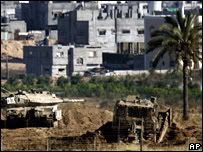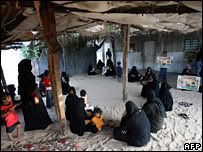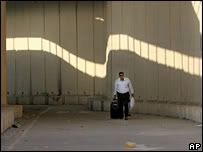Throughout 40 years of occupation, collective punishments that violate the fourth Geneva Convention have been commonplace
The BBC's Middle East editor, Jeremy Bowen:
The other week, I sat in Gaza City with Raji Sourani, the director of the Palestinian Centre for Human Rights (PCHR).
It was a hot Gaza day, the summer was winding down to the holy month of Ramadan, and outside his office not much was moving on the street.
Why should it? The economy of the Gaza Strip is in a state of collapse. The jobs that are left - and they are few - are disappearing.
Since the militant group Hamas used force to drive out its rivals, Fatah, in June, the crossing used for the passage of goods between Gaza, Israel and the outside world has been closed.
Around 1.4 million people live in the Gaza Strip. Some 1.1 million of them receive UN food rations.
For many Palestinians, it is ironic that President Abbas will talk to representatives of the Israeli government, but not to anyone from Hamas
Israel, like most of its Western allies, regards Hamas as an unreconstructed terrorist organisation bent on the destruction of the Jewish state and believes that embargo and isolation are good ways of dispatching it to the dustbin of history.
Fatah, the other main Palestinian faction, also wants pressure on Hamas kept up.
Publicly, Fatah protests about what the embargo does to Gaza's people, privately it gives tacit approval.
For many Palestinians, it is ironic that their President, Mahmoud Abbas, will talk to representatives of the Israeli government, but not to anyone who comes from the Islamist group which won a democratic election in January 2006.
Collective punishment
Raji Sourani and I discussed all of that. Then he spoke about some orange groves his family owned.
Even though Gaza is one of the most crowded places in the world, there is a surprising amount of open agricultural land.
Mr Sourani spoke of how on hot days like the one that was sweltering all around us, they would picnic in the shade of the trees.
They could not do it anymore, he said, because Israeli bulldozers had crossed into Gaza and flattened the orange groves.
A wide strip of land along the border has been cleared, Israel says for security reasons, so its soldiers can spot Palestinian militants who want to kill Israelis.
Many Palestinians say that reasons of security can also be a cover for the collective punishment of property owners.
'Worse things happen'
I was expecting Mr Sourani to talk about the pain of losing something that was full of family memories.
He said it did hurt. But he also described the way that his elderly mother, to all and intents and purposes, had told her family to pull themselves together.
Listen, she said, they were only trees. They have gone, but they can grow again.
The important thing, she told them, is that none of you are dead.
Now, what is the point of writing about all this?
As Mr Sourani's mother said, many worse things happen in Gaza. Violent death is part of everyone's life.
Later the same day, I went to the home of a family that was mourning three children, two boys aged 10 and 12, and a 12-year-old girl.
The young cousins were mistakenly killed by Israeli soldiers last month because they were playing close to rocket launchers outside Beit Hanoun.
I suppose I am mentioning Mr Sourani's mother because she displays not just a commendable sense of proportion, but also a capacity to endure. You won't get far without it in Gaza.
Israeli frustration
They need it too on the other side of the border wire in the southern Israeli town of Sderot, which is regularly rocketed from Gaza.
A couple of days after I met Mr Sourani, a rocket landed close to the town's nursery school.
Very fortunately, nobody was hurt in that attack. But it filled many Israelis who saw television pictures of terrified infants with rage and frustration.
Newspaper columnists asked what Israel would be doing if the children in the Sderot nursery school had been killed (their answer: re-invading Gaza) and angrily rejected the idea that Israel's policy should be dictated by the kill-rate of Palestinian rockets.
That started calls to find a way to punish Gazans for allowing rockets to be fired at Israel, which deepened after more than 60 Israeli soldiers were hurt in another attack.
This week, the Israeli government produced its answer.
It decided to classify Gaza a "hostile entity", and, pending a legal review, to reserve the right to impose collective punishments by cutting supplies of fuel and electricity, and by restricting the movement of people.
'Big prison'
Gaza's new status institutionalises methods that Israel is already using to ratchet up the pressure.
UN Secretary General Ban Ki-moon asked Israel to reconsider.
He said Gaza's people "should not be punished for the unacceptable actions of militants and extremists".
The Palestinians to whom I have spoken ask what is new.
For years, they have routinely described the Gaza Strip as a big prison and it is hard to argue with the description.
Throughout 40 years of occupation, collective punishments that violate the fourth Geneva Convention have been commonplace.
Echoing terminal
In Gaza today, supplies of everything are in short supply because of existing Israeli restrictions, and the movement of Palestinians into and out of the territory has already almost ceased.
Israel has built an enormous border terminal with sophisticated layers of security that culminate with a full body scan.
You enter a circular chamber, the doors of which hiss shut behind you.
A loudspeaker voice, owned by a person who presumably is watching what is happening on a TV monitor, tells you to stand with your legs apart and to raise your hands above your head.
Sensors spin and swoop round, looking for dangerous substances that you may have swallowed or inserted into your body.
It does not hurt - nothing touches you and if you pass scrutiny, you walk out into the echoing terminal, glacial with air conditioning, past security people who preside over a building that is almost empty because so few people can cross.
Perhaps the terminal is designed for a better time, of neighbourly relations between two states.
US friends only
And as life for Gaza's civilians becomes worse, Western politicians and diplomats have hopes that for the first time since the collapse of the Camp David summit in 2000, there could be a chance to restart peace talks.
For them, everything has become easier since Hamas took over in Gaza.
 Ms Rice has yet to address the problem that her strategy ignores both Hamas and the Syrian government - two entities who have the capacity to wreck anything the conference produces
Ms Rice has yet to address the problem that her strategy ignores both Hamas and the Syrian government - two entities who have the capacity to wreck anything the conference produces They can now deal solely with Fatah, which has set up a technocratic "government" without any Hamas participation.
The West - and the Israeli prime minister and the Palestinian Authority president - is focusing on a US plan for an international conference in November, which Secretary of State Condoleezza Rice is working towards this week as she tours the Middle East.
She has yet to address the problem that her strategy ignores both Hamas and the Syrian government - two entities who have the capacity to wreck anything the conference produces that they do not like. Only friends of the US are being invited.
An invitation arrived at Mr Sourani's office to meet the new Middle East peace envoy Tony Blair.
It would have meant going through the empty border terminal and to travel up to Jerusalem, but Mr Sourani was not granted a permit by the Israeli authorities.
He was frustrated, but he also cannot get a permit to visit his wife and children, who are in Egypt.
Guess which hurts most. As his mother said, keep everything in proportion.




